What happened when Spain ‘punished’ its millionaires
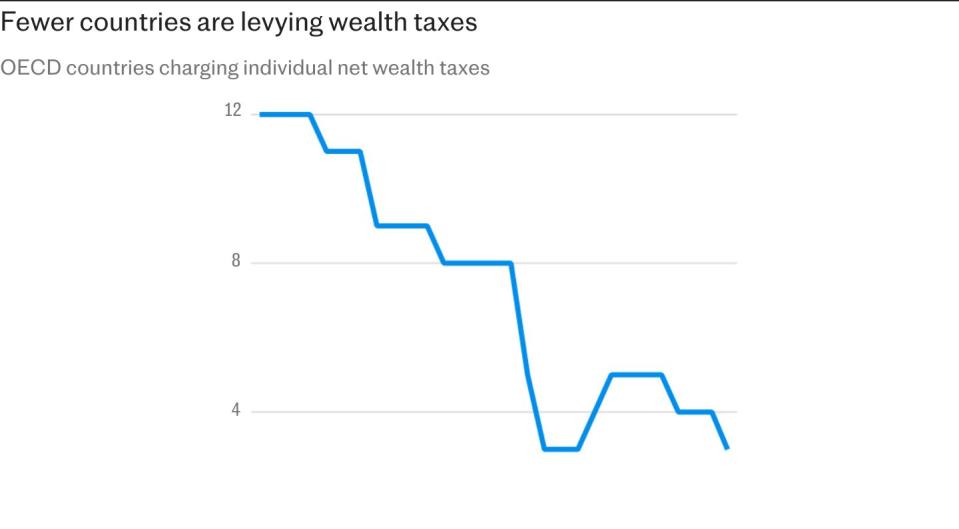
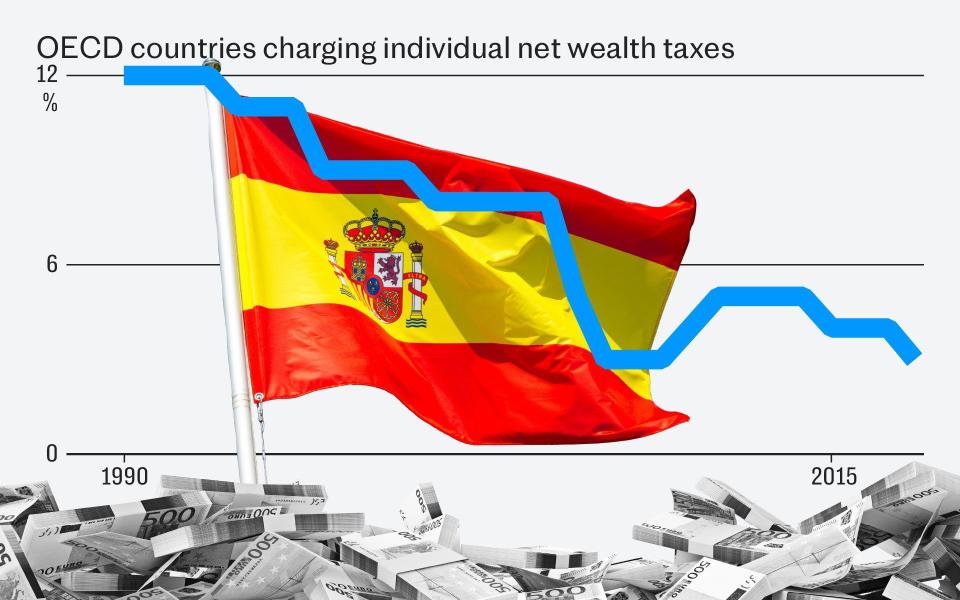
Martin Varsavsky is one of more than 12,000 multimillionaires living in Spain who were blindsided by a “solidarity” tax at the end of 2022.
Pedro Sánchez’s Socialist government introduced a temporary levy of 1.7pc on citizens whose net wealth exceeds €3m (£2.6m) rising to 3.5pc for those worth €10m or more.
The Argentine-born Varsavsky, who has founded five billion-dollar companies spanning telecoms to renewable energy, was hit by a significant tax bill.
“I felt cheated,” he says.
The 64-year-old, who now runs a network of fertility clinics in North America, says he’s thought about leaving Madrid ever since.
“I went to visit Portugal, Italy and also Florida, where I used to live,” Varsavsky says.
“What’s especially egregious in my case is that now I make all my money in the US. So Spain is making all this money out of me. So I have all the incentives in the world to move away, and I will.”
Some have already gone. The “impuesto de solidaridad a las grandes fortunas” raised just €632m in 2022, representing 0.1pc of all taxpayers in Spain.
Despite the relatively low yield, Labour’s union paymasters are already calling for the UK Government to follow suit. The Tax Justice Network claims as much as £24bn a year could be raised from the UK if it copied Spain’s model.
Sharon Graham, the leader of Unite, has urged Rachel Reeves, the Chancellor, to announce a 1pc tax on Britain’s richest 1pc. “It’s time for a wealth tax on the super-rich and a tax on excess profits. We don’t need more excuses about fiscal responsibility or talk of wealth creation,” Graham said last month.
The G20 is also exploring plans for a global minimum tax on the world’s 3,000 billionaires.
The drive is being led by Gabriel Zucman, the tax guru behind US senator Elizabeth Warren’s proposal of a 2pc levy on the world’s richest. He claims it could unlock $250bn (£189bn) a year.
However, the issue remains highly contentious, and revenues have usually disappointed.
Esther Villa, a lawyer at Osborne Clarke in Barcelona, says the levy had a chilling effect on Spain’s entrepreneurs.
“The initial response from many of my clients was a feeling of being punished for being successful.” But she also notes that initial revenues were disappointing.
“When the solidarity tax was adopted, the government made a big deal of what they expected to collect, but what was collected in 2023 is less than half what was anticipated,” adds Villa.
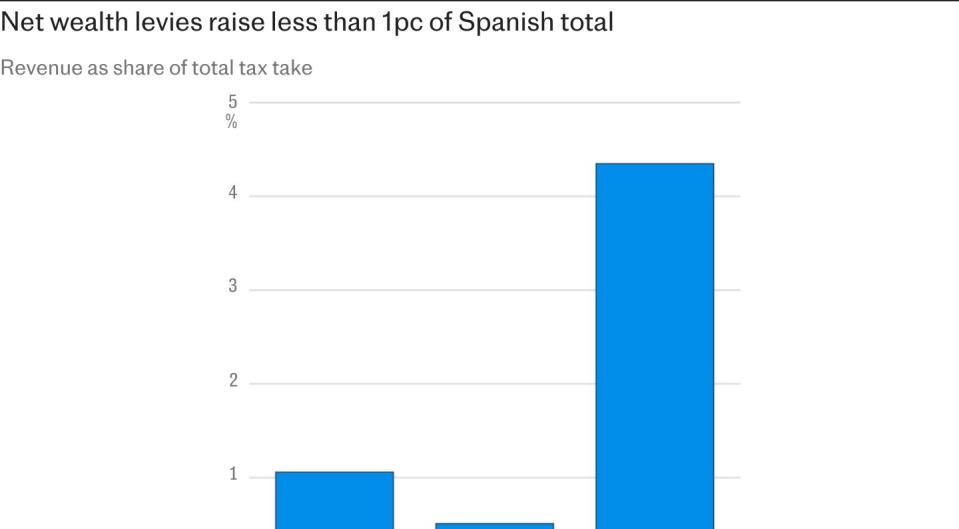
Still, Villa says one reason revenues flowed in in the first year was people had very little time to plan before being hit with their first bill.
But she says this is unlikely to be repeated.
“Feedback from clients suggests they are aware of the things they have to do in terms of how to structure their assets to make sure that the impact is as efficient as possible.”
Together with Spain’s existing wealth tax, the country raised €1.9bn from various levies in 2022.
While the figure is not to be sneered at, it’s also the equivalent of making all of Spain’s 1.2m dollar millionaires pay just over €1,500 each.
Meanwhile, the number of countries imposing a wealth tax has dwindled. Just over three decades ago in 1990, 12 countries had one. Today, only Norway, Spain, and Switzerland remain and the yields in these countries are low while the deterrents are high.
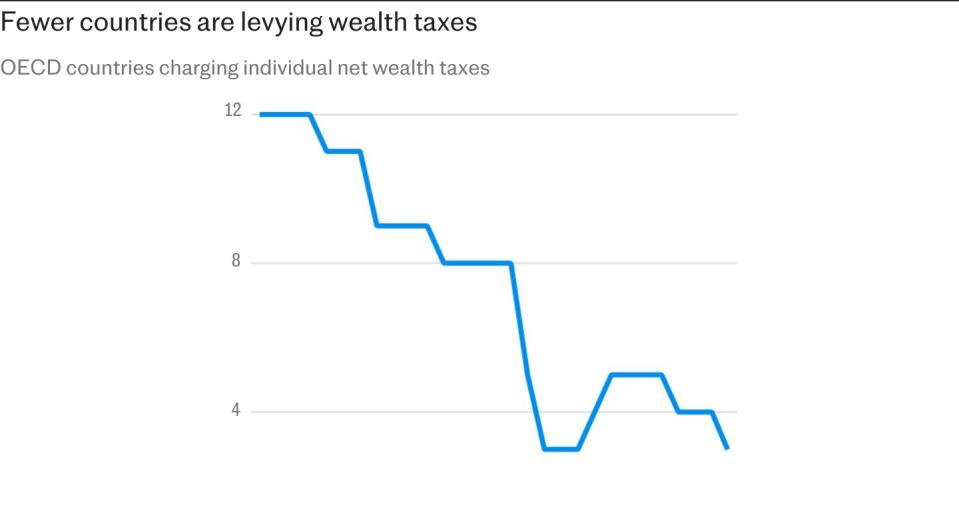
Emmanuel Macron ditched France’s wealth tax just over five years ago following an exodus of billionaires to destinations including the UK.
According to the OECD, countries have ditched them because they cost too much to administer, distort investment decisions and punish people who are asset-rich but cash-poor. The people it’s designed to target can also leave if they want to.
In short, wealth taxes don’t really raise much cash.
The closest the UK came to introducing an explicit wealth tax one was in the mid-1970s inflation strike that led to mass strike action.
Denis Healey, then-Labour chancellor, wrote in his memoirs: “We had committed ourselves to a wealth tax; but in five years I found it impossible to draft one which would yield enough revenue to be worth the administrative cost and political hassle.”
Chris Sanger, the global head of tax policy at EY, says the costs of administering a wealth tax should not be underestimated.
“The problem is the mechanism for calculating wealth. Because every year you’ve got to calculate the value of an asset that doesn’t always have a ready price,” says Sanger.
“It’s easy if it’s stocks and shares that are quoted, but if you’ve got a house that you’ve owned, how much has that increased in value? If it’s a painting sitting on the wall, has that gone up in value?
“Of course, people sometimes do this once upon death or for inheritance tax purposes where you actually have to go and get a valuation. But doing that once is very different from doing that every year for a wealth tax.”
Sanger says this can make getting wealth taxes in an arduous business, while the basic premise of a wealth tax sends out a signal that countries aren’t open for business.
“There are theoretical benefits for going for a wealth tax,” he adds. “The challenge with one is as the rate gets higher, it becomes more and more of a deterrent for people to actually have wealth. It’s also a tax that needs to be collected.”
Villa, at Osborne Clarke, admits that Spain’s tax grab has so far not led to billionaires leaving Spain in their droves.
“There has been no exodus. Lots of people took it in their stride the fact that it was supposed to be temporary. Having said that, I think there’s a high likelihood that it will be upheld for 2024, and subsequent years.”
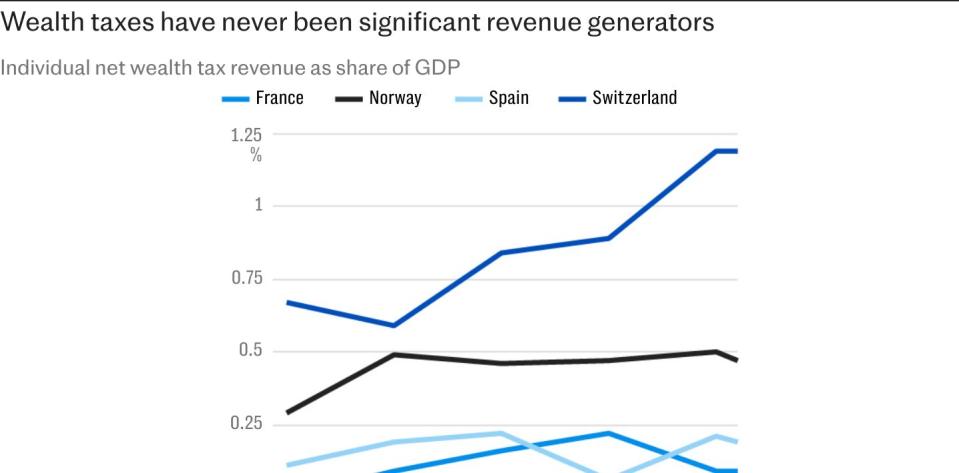
For all his complaints, Varsavsky is also still living in Madrid.
“It’s a family thing,” he says. “My children are still at school here, and they have their friends and everything here. It’s difficult because of course taxes are not the only thing. I have seven children: two live in London, one lives in New York and then the other four in Madrid.”
However, he is leaving his options open. “There’s an issue of age. It’s not the same thing to tax a person who’s 30, who has many more years to make money, than to tax a person who is 70 and needs to have savings,” adds Varsavsky.
“If you start taking 3.5pc of their money year after year, then you end up having much less money at a time in your life when you can’t even go out and make more. So it’s pretty unattractive for anyone who has done moderately well in life to stay in Spain.”
Varsavsky says he’s banking on a change of administration, with Sanchez currently leading a precarious minority government.
“My hope here is that this will be short-lived, as the title of the tax is called, and they will go back to the way things used to be,” he adds.
“If not, eventually I will move out. Because it gets to a point where, in my sixties, it makes no sense to be in a place where my savings are taken away.
“It’s a pity, because Spain is a wonderful country to live in, but not if you are being forced to be impoverished year after year.”








